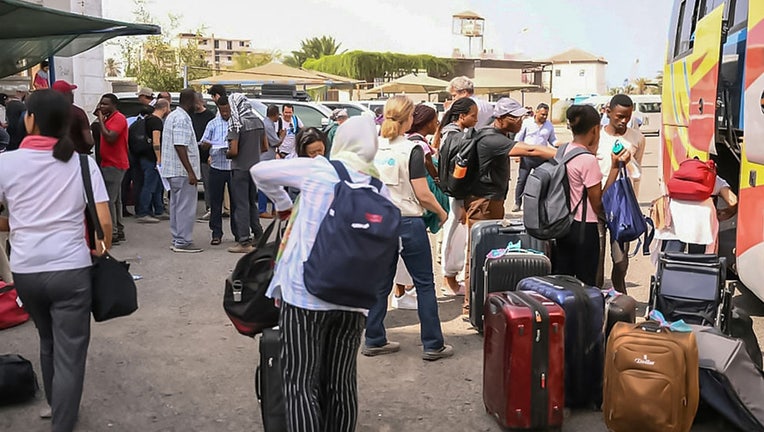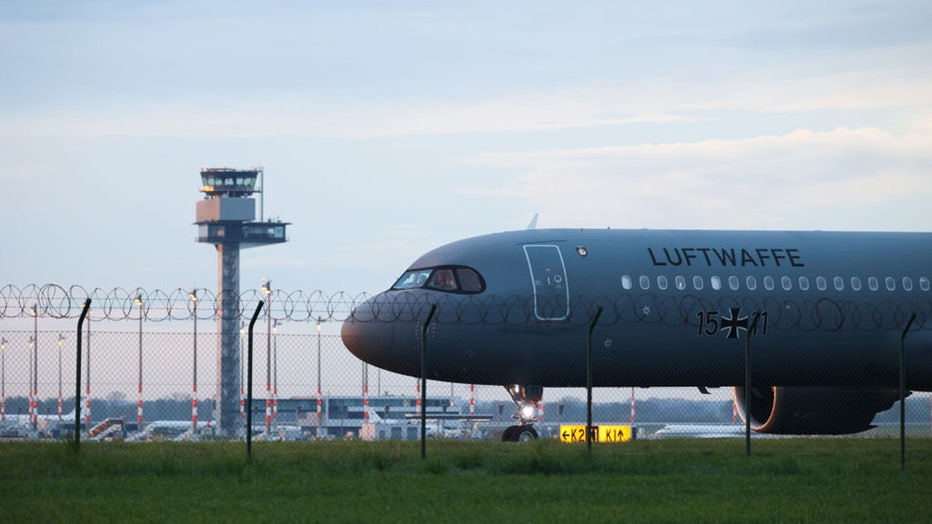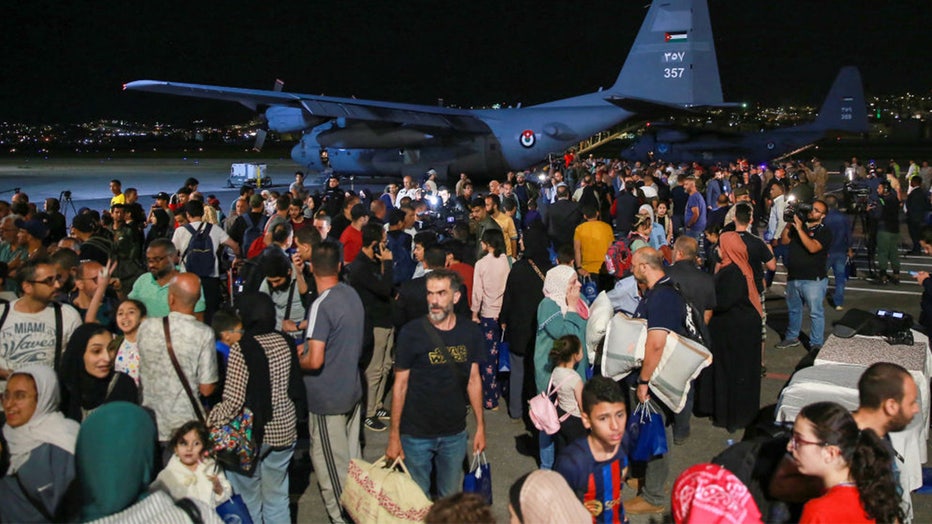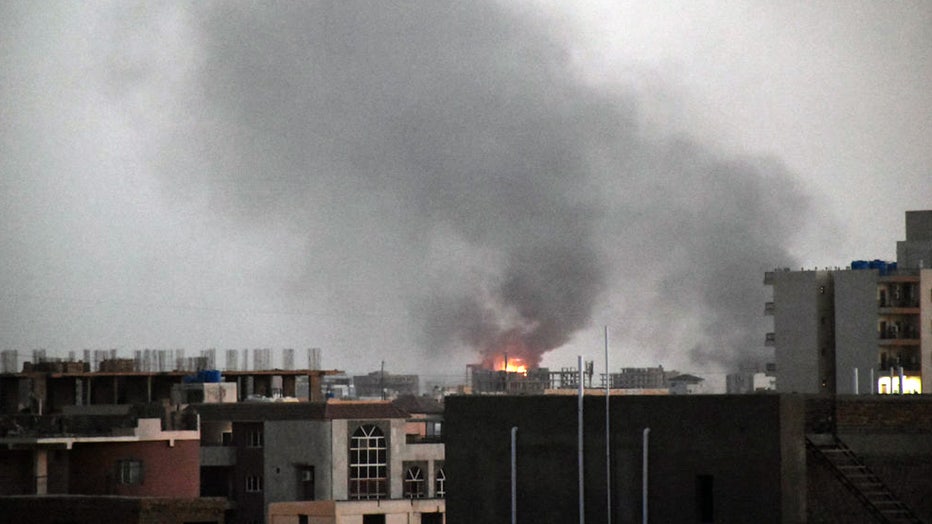Hundreds of foreigners airlifted amid fighting, Sudanese seek refuge

Internationally-recruited personnel of the United Nations Integrated Transition Assistance Mission in Sudan are evacuated from Port Sudan on April 24, 2023. (AFP via Getty Images)
KHARTOUM, Sudan - As foreign governments airlifted hundreds of their diplomats and other citizens to safety, Sudanese on Monday desperately sought ways to escape the chaos, fearing that the country’s two rival generals will escalate their all-out battle for power once evacuations are completed.
In dramatic evacuation operations, convoys of foreign diplomats, civilian teachers, students, workers and families from dozens of countries wound past combatants at tense front lines in the capital of Khartoum to reach extraction points. Others drove hundreds of miles to the country's east coast. A stream of European, Mideast, African and Asian military aircraft flew in all day Sunday and Monday to ferry them out.
But for many Sudanese, the airlift was a terrifying sign that international powers, after failing repeatedly to broker cease-fires, only expect a worsening of the fighting that has already pushed the population into disaster. The latest nominal cease-fire, which brought almost no reduction in fighting, was due to run out Monday evening.
U.N. Secretary-General Antonio Guterres warned of a "catastrophic conflagration" that could engulf the whole region. He urged the 15 members of the Security Council to "exert maximum leverage" on both sides in order to "pull Sudan back from the edge of the abyss."
Sudanese face a harrowing search for safety in the constantly shifting battle of explosions, gunfire and armed fighters looting shops and homes. Many have been huddling in their homes for nine days. Food and fuel are leaping in price and harder to find, electricity and internet are cut off in much of the country, and hospitals are near collapse.

An Air Force Airbus lands at BER Airport with German citizens evacuated from Sudan. (Jörg Carstensen/picture alliance via Getty Images)
Those who can afford it were making the 15-hour long drive to the Egyptian border or to Port Sudan on the east coast. Those without means to get abroad streamed out to relatively calmer provinces along the Nile north and south of Khartoum. Many more were trapped, with cash in short supply and transport costs spiraling.
"Traveling out of Khartoum has become a luxury," said Shahin al-Sherif, a high school teacher. The 27-year-old al-Sherif was frantically trying to arrange transport out of Khartoum for himself, his younger sister, mother, aunt and grandmother. They had been trapped for days in their home in Khartoum’s Amarat neighborhood while fighting raged outside. Finally, they moved to a safer district farther out.
But al-Sherif expects things to get worse and worries his sister, aunt and grandmother, all diabetic, won't be able to get the supplies they need. Bus ticket prices have more than quadrupled so that renting a bus for 50 people to get to the Egyptian border costs around $14,000, he said.
Amani el-Taweel, an Egyptian expert on Africa, warned of "horrific suffering" for Sudanese unable to leave. In a country where a third of the population already needed humanitarian aid, aid agencies can no longer reach most Sudanese because of the clashes.
Once evacuations are complete, "warring parties will not heed any calls for a truce or a cease-fire," she said.
Heavy gunfire and thundering explosions rocked the city in continued fighting between the military and a rival paramilitary group called the Rapid Support Forces. In the afternoon, intensified airstrikes hammered Khartoum's Nile-side Kalakla district for an hour until the area was "razed to the ground," said Atiya Abdulla Atiya, secretary of the Doctors’ Syndicate. The bombardment sent dozens of wounded to the Turkish Hospital, one of the few medical facilities still functioning, he said.
Over 420 people, including at least 273 civilians, have been killed and over 3,700 wounded since the fighting began April 15. The military has appeared to have the upper hand in fighting in Khartoum but the RSF still controls many districts in the capital and the neighboring city of Omdurman, and has several large strongholds around the country. With the military vowing to fight until the RSF is crushed, many fear a dramatic escalation.

People evacuated from Sudan arrive at a military airport in Amman on April 24, 2023. (KHALIL MAZRAAWI/AFP via Getty Images)
For foreign nationals, the need to abandon Khartoum had become overwhelming by the seventh day of the conflict. Khartoum’s wealthy neighborhoods, where most foreigners live, saw some of the heaviest shelling and drone strikes, and several fell under RSF control.
Alice Lehtinen, a British teacher living in the Khartoum Two neighborhood, was shot in the foot by a stray bullet on the first day of fighting. Soon after, RSF troops occupied the lower floor of her apartment building as they combed the streets for weapons, dollars and other supplies, she said. The Sudanese pound has become worthless as shops lay smashed and looted.
Another British teacher, Elizabeth Boughey, said the RSF broke into her house and stole her Sudanese pounds, then returned soon after to hand the money back. They looked like teenagers she said.
The United States and Britain swooped in to extract their diplomats and their families Sunday but said a broader evacuation of private citizens was not possible for the moment. The European Union, in contrast, ran a coordinated operation that brought out hundreds of their citizens and gave a helping hand to nationals of other countries.
France secured use of a base on the outskirts of Khartoum to use as an extraction point after intense negotiations with both sides — the military that held the base and the RSF that held the surrounding districts, a French diplomatic official said, speaking on condition of anonymity to discuss the operation.
Amid continued gunfire, nationals from dozens of countries made their way to the base. Some braved the roads in their own vehicles while others called on private security firms to shepherd them through military and RSF checkpoints.

A smoke rises after an intense shelling and gunfights between soldiers and gunmen from the paramilitary Rapid Support Forces in Sudan on April 21, 2023, despite a three-day ceasefire at north of Khartoum, Sudan. (Omer Erdem/Anadolu Agency via Getty Images)
France brought out nearly 500 people, including citizens from 36 countries, on flights to the nearby Horn of Africa nation of Djibouti. Military planes from the Netherlands, Germany, Italy, Spain, Jordan and Greece also picked up loads of passengers.
Meanwhile, groups of South Koreans, Palestinians, Kenyans, Saudis and other nationalities made the 13-hour drive from Khartoum to the still operating airport in the eastern Red Sea city of Port Sudan to be picked up by their nation’s aircraft. Japan said it evacuated 45 of its citizens and their families via Port Sudan and was working on getting the small number of Japanese who remain in the country out.
Flights continued into Monday afternoon, and France, Germany and the Netherlands said they were prepared to do more flights if possible. Britain’s Middle East Minister Andrew Mitchell said about 2,000 U.K. citizens still in Sudan have registered with the embassy for potential evacuation. He told the BBC the government was looking at "a series of possible evacuations." Many Britons in the country have complained about a lack of information from the government and say they are in the dark about any evacuation plans.
Despite the pullout, U.S. and European officials insisted they were still engaged in trying to secure an end to the fighting. But so far the conflict has shown how little leverage they have with two generals — army chief Abdel-Fattah Burhan and RSF leader Mohammed Hamdan Dagalo — who appear determined to fight to the end.
The U.S. and EU have been dealing with the generals for years, trying to push them into ceding power to a democratic, civilian government. A pro-democracy uprising led to the 2019 ouster of former strongman Omar al-Bashir. But in 2021, Burhan and Dagalo joined forces to seize power in a coup.
—
Elhennawy reported from Cairo. Associated Press writers Michael Corder in The Hague, Netherlands, Angela Charlton in Paris, Frances D’Emilio in Rome, Frank Jordans in Berlin and Edith M. Lederer at the United Nations contributed to this report.

